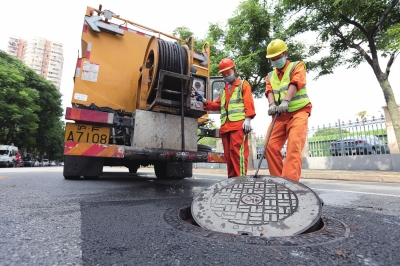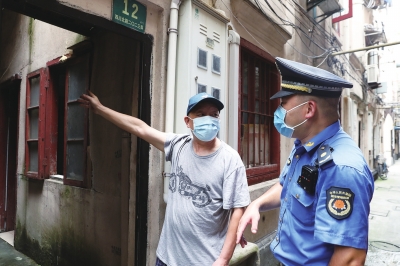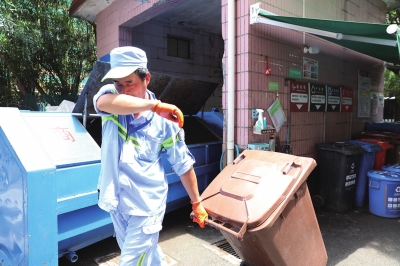Outdoor Workers Safeguard Hongkou in Hot Spell



By Qi Chuanbin
Shanghai has recently undergone a new round of scorching weather, so it will soon be sweaty even if standing still outside after a while. But, there are always some people firmly sticking to their jobs in the hot spell to safeguard Shanghai. Thus, a visit to the outdoor workers has been carried out to record their work under the high temperature.
Environmental sanitation workers: we sweat over the work every day.
A lot of jobs need less efforts every summer, but the collection and transportation of wet trash needs more of that, because the higher the temperature, the more wet trash the residents will make. Leftovers are not suitable for long-term preservation, while peels of perishable melons and fruits are increased significantly, which will seriously affect the community environment and soon emit an awful smell to attract a large number of mosquitoes and flies if not transport them in time, thus endangering the health of residents.
Shi Zhongan, a trip rider from Hongteng Environmental Cleaning Co., Ltd., carefully checks the quality of refuse sorting in the wet trash can with an orange colloid gloves at 11:00 in Commodity Inspection Apartment, No. 2, Lane 270,Yutian Road. After confirming that there is no trash mixing in the bucket, Shi holds his feet against the bottom of the trash can, presses the bucket handle with both hands, pulls the wet trash can out of the dump, and moves it towards the wet trash truck several meters away.
Afterwards, Shi skillfully cooperates with the fellow drivers to complete all the work in less than 5 minutes, including lowering the lifting plate, collecting the trash, dragging the can, lifting the lifting plate, and cleaning the ground, which needs two people to repeat nearly 100 times from 09:00 to around 16:00. As soon as it is full with eight 240-liter wet trash cans, the truck will be driven back to Huangshan Road Transfer Station to unload the trash, and then continue to load the trash again, which takes at least four or five times a day.
However, many roads in Hongkou’s old communities are narrow, so the refuse sorting dumps can not have the truck in, which needs the trip riders to drag the bucket to the road. According to Shi, there is a furthest road of more than 200 meters in his 54 in-charge dumps, which allows to drag only a bucket at a time and needs a few times to finish the whole work. In the hot spell like this, there are blisters on the soles of their feet because they drag 240-liter wet trash cans that are filled with about 200kg trash. "It is normal to sweat heavily every day like this, but we are surprisingly sweating buckets."
The City Maintainers: we de-silt under the hot sun.
If a city is regarded as a human body, the underground rainwater pipe network is like capillaries all over the human body. The municipal drainage pipe maintainers are the cleaners who guard the capillaries, and 49-year-old Xu Weihong is one of them.
Xu's team has started the dredging work on New Tongxin Road while the road traffic is light at 13:30. On the that day, they complete to wash and clean nearly-600-meter rainwater pipes under the road section. Mr. Xu opens the municipal manhole cover, then works with his partners to operate the high-pressure flushing car and cleans the silt in the rainwater pipes over and over again. The smelly silts are washed into the rainwater well; and then Mr. Xu takes the tools to skillfully clean some stones and silts out of the well, and pours them into the sludge transport truck nearby.
Within minutes their long-sleeved overalls are wet with sweat dripping from their faces. Although the weather forecast introduces that it reaches up to 35 ℃, the actual temperature on the ground could be as high as 40 ℃, according to Xu. Therefore, they carry cups holding 1.5-liter water at least, and can drink several cups of water every day.
After the flood season, it is more possible to have typhoon and rainstorm, and the municipal drainage pipe maintainers are the busiest of the year, according to the head of the District Water Affairs Center.
The urban management officers: there is nothing trivial when it is about residents.
It is one of the hottest moment of the day at 14:00. Under such a high temperature, Fan Dongyao, the head of the urban management team of North Sichuan Road Sub-district, has been riding a patrol bicycle for half an hour, and will immediately stop to exhort the across-the-door business and the occupation of road once finding any one of that in the shops along the street.
At the intersection of North Sichuan Road and Qiujiang Road, Fan’s mobile phone in the pocket rings again, which turns out that the system of "Smart City Management" gives him a new task. There is a public complaint about cooking fume disturbing the people in some place on North Sichuan Road, and then Fan takes on the task.
Fan arrives at the place 15 minutes later and finds that a resident living at Lane 2023, North Sichuan Road complain that the cooking fume from next-door neighbor always drifts into their home through the hole in the wall, especially when the neighbor cook spicy food. Strictly speaking, it is not in the scope of urban management law enforcement. But, Fan wants to give a hand, knocks the door of the neighbor, and decides to block the hole through communication and consultation to completely solve the problem. The next morning, Fan leads the sub-district construction team to the residents' house to plug the hole in less than half an hour. Such an efficiency pleads the resident, "I thought it was a long shot to call the urban management department for help, but it is surprisingly effective to solve the problem. I want to send them a thank-you banner."
In fact, it is not the first time for Fan to receive the tasks like this, which accounts for nearly 70% of monthly complaints. According to him, the urban management law enforcement in residential area is more and more inclined to serve the people by taking actions in terms of "no unauthorized buildings, no pilling-ups in corridor, no cross-door business, no illegal business, no illegal residence, or no illegal drain contamination", and "the North Bund functional area, urban renewal area, night-time economy area, key business area, historical and cultural area, the District Government Administrative Center, residential area, and the area with serious problems" in an orderly manner in recent years. "There is nothing trivial when it is about residents. It is more important to make them comfortable than to work harder on our own."
Since 2018, the construction of service relay stations for outdoor workers has been included into the projects of the Municipal Government, which serves environmental sanitation workers, urban management members, deliverymen, traffic warden, etc. If the outdoor workers are thirsty and tired, they can have a place to take a rest nearby. Up to now, Hongkou has increased to build 81 stations that are partially upgraded, which basically realizes the goal to reasonably set up the stations in the whole district, thus effectively helping the outdoor workers tranquilly work in the summer.